| Srl | Item |
| 1 |
ID:
129074
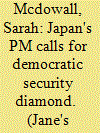

|
|
|
| 2 |
ID:
129590
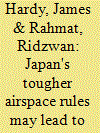

|
|
|
| 3 |
ID:
131260
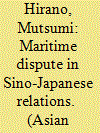

|
|
|
|
|
| Publication |
2014.
|
| Summary/Abstract |
My aim in this article is to shed light on some domestic dimensions of the maritime dispute between China and Japan in the East China Sea, in particular those of the Japanese side. The domestic dimensions are important because many actors are involved and the dispute is multidimensional. We may need to set longer time frames in order to find exit strategies and at least mitigate the influence of this seemingly intractable dispute. I suggest mid- to long-term alternative approaches to resolving it.
|
|
|
|
|
|
|
|
|
|
|
|
|
|
|
|
| 4 |
ID:
129622


|
|
|
| 5 |
ID:
167074


|
|
|
|
|
| Summary/Abstract |
What are the consequences of nationalist unrest? This paper utilizes two original datasets, which cover 377 city-level anti-Japanese protests during the 2012 Senkaku/Diaoyu Island crisis and the careers of municipal leaders, to analyse the downstream effects of nationalist unrest at the subnational level. We find both political and economic consequences of China's 2012 protest demonstrations against Japan. Specifically, top Party leaders in cities that saw relatively spontaneous, early protests were less likely to be promoted to higher office, a finding that is consistent with the widely held but rarely tested expectation that social instability is punished in the Chinese Communist Party's cadre evaluation system. We also see a negative effect of nationalist protest on foreign direct investment (FDI) growth at the city level. However, the lower promotion rates associated with relatively spontaneous protests appear to arise through political rather than economic channels. By taking into account data on social unrest in addition to economic performance, these results add to existing evidence that systematic evaluation of leaders’ performance plays a major role in the Chinese political system. These findings also illuminate the dilemma that local leaders face in managing popular nationalism amid shifting national priorities.
|
|
|
|
|
|
|
|
|
|
|
|
|
|
|
|
| 6 |
ID:
139560
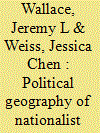

|
|
|
|
|
| Summary/Abstract |
Why do some Chinese cities take part in waves of nationalist protest but not others? Nationalist protest remains an important but understudied topic within the study of contentious politics in China, particularly at the subnational level. Relative to other protests, nationalist mobilization is more clustered in time and geographically widespread, uniting citizens in different cities against a common target. Although the literature has debated the degree of state-led and grassroots influence on Chinese nationalism, we argue that it is important to consider both the propensity of citizens to mobilize and local government fears of instability. Analysing an original dataset of 377 anti-Japanese protests across 208 of 287 Chinese prefectural cities, we find that both state-led patriotism and the availability of collective action resources were positively associated with nationalist protest, particularly “biographically available” populations of students and migrants. In addition, the government's role was not monolithically facilitative. Fears of social unrest shaped the local political opportunity structure, with anti-Japanese protests less likely in cities with larger populations of unemployed college graduates and ethnic minorities and more likely in cities with established leaders.
|
|
|
|
|
|
|
|
|
|
|
|
|
|
|
|
| 7 |
ID:
088451


|
|
|
|
|
| Publication |
2009.
|
| Summary/Abstract |
Can economic interdependence reduce conflicts among states in East Asia? The so-called 'cold politics and hot economics' has become a defining feature of Sino-Japanese political-economic relations. This puzzling pattern of interaction is clearly illustrated in the sovereignty dispute over the Senkaku/Diaoyu Islands. The island dispute has unfolded in five rounds of distinct clashes thus far. From one perspective, the competitive elements in the island dispute make it difficult for both Japan and China to give way to the other side on the territorial and maritime issues. At the same time, the two countries have successfully managed to contain their respective territorial and maritime claims thus far. Drawing on the liberal peace theory, this article systematically demonstrates that economic interdependence has repeatedly fostered the de-escalation of Sino-Japanese conflict over territorial and maritime rights
|
|
|
|
|
|
|
|
|
|
|
|
|
|
|
|
| 8 |
ID:
145144


|
|
|
|
|
| Summary/Abstract |
Senkaku/Diaoyu islands dispute has caused tensions among China, Japan, and Taiwan for decades. Although the Taiwanese government keeps a low profile on the dispute, the issue has flared up online discussion among Taiwan’s netizens. Many consider Taiwanese people more pro-Japan than other countries in East Asia, as elder generation living on the island shares nostalgia toward Japan, and as its younger generation charmed by Japanese manga and anime, let alone Taiwan being the top donor to Japan’s 311 earthquake. In this vein, Taiwanese people should accommodate well with Japan. However, Senkaku/Diaoyu islands dispute may tell another story. The act of Japanese government to nationalize Senkaku/Diaoyu islands in 2012 has provoked anger among its neighbor countries. Are Taiwanese people in favor of Japan’s stance on Senkaku/Diaoyu islands dispute due to the attachment for Japan or the other way round? This paper applies text mining technique and sentiment analysis to the digital data of Taiwan’s largest bulletin board system station—PTT—established by college students and extracts postings concerning Senkaku/Diaoyu islands dispute in the past 4 years (2009~2012). By this bottom-up approach, we aim to examine Taiwan’s netizens’ emotion toward the two hegemonies—i.e., Japan and China—and to see whether the strong attachment to Japan has any impact on netizens’ opinions on the dispute.
|
|
|
|
|
|
|
|
|
|
|
|
|
|
|
|
| 9 |
ID:
123358


|
|
|
|
|
| Publication |
2013.
|
| Summary/Abstract |
Although China's assertiveness has been a major factor in the latest hardening of relations in East Asia, Beijing's retreat from soft power has not necessarily benefited those who are viewing the rise of China most anxiously."
|
|
|
|
|
|
|
|
|
|
|
|
|
|
|
|
| 10 |
ID:
131213


|
|
|
| 11 |
ID:
187225
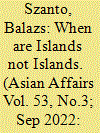

|
|
|
|
|
| Summary/Abstract |
The article takes a critical look at the sovereignty claims surrounding the Senkaku / Diaoyu Islands. The dispute has long plagued Sino-Japanese relations and is considered one of the key regional security hotspots, with the People's Republic of China mounting an active challenge to Japanese administrative control. This article reviews the case for sovereignty under both the discovery and the prescription principles. However, the article concludes that one cannot find a compelling case for sovereignty under either principle in favour of either claimants. The paper argues that this is due to the traditional insignificance of the islands prior to UNCLOS establishing exclusive economic zones. Rather, the article suggests that to facilitate a resolution to the disputes, the islands should not be classified as islands under UNCLOS as they do not meet the legal threshold for such a classification, either today or historically. If anything, the weakness of claims that contributes to the intractability of the dispute today shows that traditionally neither China nor Japan has considered these territories as islands in a manner that would be in the spirit of UNCLOS. While such a reclassification would not immediately resolve the dispute, it would be a significant step to remove incentives for the further pursuit of conflicting sovereignty over the islands.
|
|
|
|
|
|
|
|
|
|
|
|
|
|
|
|